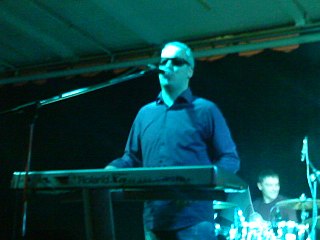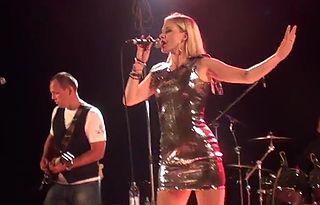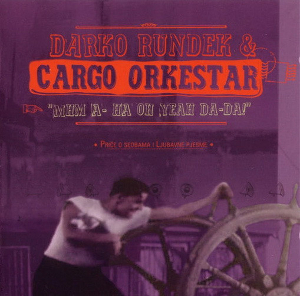
Darko Rundek is a Croatian rock singer, songwriter, poet, and actor. His music career started in the early 1980s, as the frontman of the world music influenced rock band Haustor. He emigrated to France after the Yugoslav wars started in 1991, and has recorded eight albums with various musicians from different parts of the world: Apokalipso, U širokom svijetu, Ruke, MHM A-HA OH YEAH DA-DA, Balade Petrice Kerempuha, Plavi avion, Mostovi and Brisani prostor.
Mate "Mišo" Kovač is a Croatian recording artist. He is the best selling artist from Croatia and former Yugoslavia, with well over 20 million records, cassettes and compact discs sold to date, and is often regarded as one of the most popular musical performers from Southeastern Europe.

Ante Tomić is a Croatian left wing writer and journalist.
Boris Ivković, better known by his stage name Bore Lee, is a Croatian martial arts enthusiast, amateur filmmaker and actor from Sinj.

Aleksandar Matić, better known as Saša Matić is a Bosnian Serb pop-folk singer.
The Gospić massacre was the mass killing of 100–120 predominantly Serb civilians in Gospić, Croatia during the last two weeks of October 1991, during the Croatian War of Independence. The majority of the victims were ethnic Serbs arrested in Gospić and the nearby coastal town of Karlobag. Most of them were arrested on 16–17 October. Some of the detainees were taken to the Perušić barracks and executed in Lipova Glavica near the town, while others were shot in the Pazarište area of Gospić. The killings were ordered by the Secretary of Lika Crisis Headquarters, Tihomir Orešković, and the commander of the 118th Infantry Brigade of the Croatian National Guard, Lieutenant Colonel Mirko Norac.

"¡Ay Carmela!" is one of the most famous songs of the Spanish Republican troops during the Spanish Civil War.

Jelena Rozga is a Croatian pop, folk, and electropop singer. Born and raised in Split, Croatia, Rozga was a ballet dancer as a child. She rose to fame in 1996, when she became the lead singer of Magazin, a pop band famous in Croatia. She served as the band's lead singer until 2006, releasing a total of five studio albums. During the ten years, the band released numerous commercially and critically successful singles including "Ginem", "Minut' srca tvog" and "Minus i plus" among others.

Spaladium Arena is a multi-purpose indoor arena located in Split, Croatia. It was opened in December 2008, and hosted the following month's World Men's Handball Championship in 2009. The hall will host the event again in 2025 with Croatia, Denmark, and Norway as national co-hosts.
Juraj Njavro was a Croatian medical doctor and politician.

Bobby Bosko Grubic is a Croatian American producer, director, songwriter, composer, singer, entrepreneur, and environmental activist.
The Croatian War of Independence has been the subject of a number of feature films and documentaries. Those include:

Ex YU rock enciklopedija 1960–2006 is a book by Serbian author, journalist and music critic Petar Janjatović. Published in 2007, the book represents the third, expanded edition of Janjatović's 1998 book Ilustrovana YU rock enciklopedija 1960–1997. The book features information about most important acts of the rock scene of Socialist Federal Republic of Yugoslavia, as well as of scenes of the successor states.
Dušan Vranić, known by his nickname Duco, is a Bosnian musician who is a member of the Darko Rundek's band. Formerly, he was a member of a Bosnian garage rock band Zabranjeno Pušenje.
Đani Pervan is a Bosnian musician, songwriter, record producer, and sound engineer.

Dovitljivi mali čudaci is the fifth album by Haustor, which was supposed to be released in the early 90s, but was released in 2017 on the occasion of the reissue of Darko Rundek's digitally remastered album Apokalipso. As Rundek himself stated, Dovitljivi mali čudaci was never published because the composition did not particularly like the material, so "even now he would not put his hands in the fire for those songs", referring to their arrangements, because "Ista slika" and " Señor" are part of the repertoire at almost every Rundek Cargo Trio concert. These two songs are the most interesting for the audience, because of the stories behind them, but also because of the changed text in the case of the composition "Señor.

Tajni grad is the fourth studio album by Yugoslav and Croatian group Haustor. The album was released in 1988 by Jugoton. The biggest hits from this album are "Skidaj se", "Samo na čas", "Ula ulala" and "Uzalud pitaš".

Treći svijet is the second studio album by the rock group Haustor. The album was released in 1984.

Apokalipso (Apocalypso) is the first solo album of Croatian singer Darko Rundek. The album contains 12 songs, of which the title track and Señor are hits. The name itself comes from the words apocalypse and calypso. The album was released at the transition from 1996 to 1997.

Mhm a-ha oh yeah da-da is the only studio album of the group Cargo Orkestar whose leader was Darko Rundek. On this album, the songs were sung in Croatian, English, German and French. The album was released in June 2006 by Menart.













